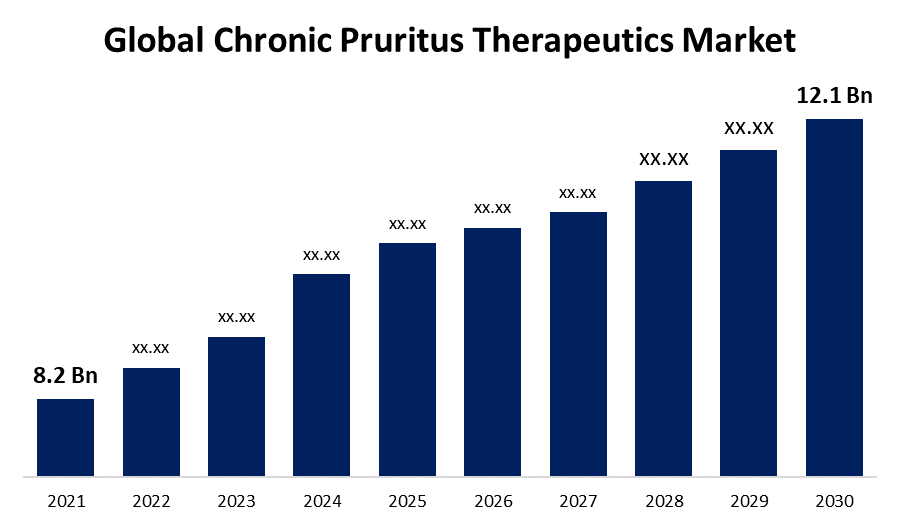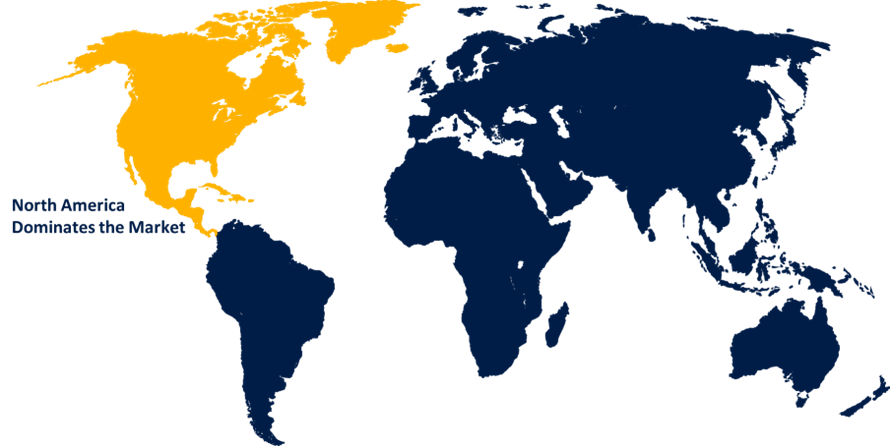Global Chronic Pruritus Therapeutics Market Size, Share, and COVID-19 Impact Analysis, By Product Type (Corticosteroid, Antihistamine, Local Anesthetic, Counterirritant, Immunosuppressant, Calcineurin Inhibitors, Other Product Types), By Disease Type (Atopic Dermatitis, Allergic Contact Dermatitis, Urticaria, Others), By Distribution Channel (Hospital Pharmacies, Drug stores & Retail Pharmacies, Online providers), By Region (North America, Europe, Asia-Pacific, Latin America, Middle East, and Africa), Analysis and Forecast 2021 – 2030
Industry: HealthcareGlobal Chronic Pruritus Therapeutics Market Insights Forecasts to 2030
- The Global Chronic Pruritus Therapeutics Market Size was valued at USD 8.2 Billion in 2021.
- The Market is Growing at a CAGR of 4.4% from 2022 to 2030.
- The Worldwide Chronic Pruritus Therapeutics Market size is expected to reach USD 12.1 Billion by 2030.
- Asia Pacific is expected to grow the fastest during the forecast period.

Get more details on this report -
The Global Chronic Pruritus Therapeutics Market Size is expected to reach USD 12.1 Billion by 2030, at a CAGR of 4.4% during the forecast period 2022 to 2030. Players in the chronic pruritus therapeutics market now have greater opportunities to grow their businesses as a consequence of some chronic pruritus therapeutic products' patent expiry.
Market Overview
Chronic pruritus is a disorder initiated due to dermatological infections such as contact dermatitis, chickenpox, mycoses, and atopic dermatitis. The itching that occurs on the skin as a result of different conditions, including dry skin, allergies, and other ailments, is known as pruritus. When pruritus lasts for a longer period, it usually indicates a more severe underlying cause. In addition, there are several fundamental etiologies for pruritus, for example, Hepatogenic pruritus is caused by jaundice and hepatitis, uremic pruritus is caused by dialysis and chronic kidney illness, and other kinds are caused by medications. The International Forum for the Study of Itch (IFSI) has determined that there are three different pruritus disorders: pruritus on normal skin, pruritus on inflamed skin, and pruritus with chronic secondary scratch lesions. In lack of a skin disorder, many people with chronic pruritus have skin sores that are mostly caused by skin dryness, scratching or insect bites. As a result, the IFSI categorization helps to distinguish between disease-induced and non-specific disease-induced pruritus diseases. Additionally, new medicines for treating pruritus have emerged as a result of an increased understanding of the pathophysiology of chronic itchiness and access to high-quality data from clinical investigations.
Report Coverage
This research report categorizes the global chronic pruritus therapeutics market based on various segments and regions and forecasts revenue growth and analyses trends in each submarket. The report analyses the key growth drivers, opportunities, and challenges influencing the global chronic pruritus therapeutics market. Recent market developments and competitive strategies such as expansion, product launch, and development, partnership, merger, and acquisition have been included to draw the competitive landscape in the market. The report strategically identifies and profiles the key market players and analyses their core competencies in each sub-segments of the global chronic pruritus therapeutics market. Technological innovation and advancement will further optimize the performance of the product, enabling it to acquire a wider range of applications in the downstream market.
Global Chronic Pruritus Therapeutics Market Report Coverage
| Report Coverage | Details |
|---|---|
| Base Year: | 2021 |
| Market Size in 2021: | USD 8.2 Billion |
| Forecast Period: | 2021-2030 |
| Forecast Period CAGR 2021-2030 : | 4.4% |
| 2030 Value Projection: | USD 12.1 Billion |
| Historical Data for: | 2017-2020 |
| No. of Pages: | 200 |
| Tables, Charts & Figures: | 100 |
| Segments covered: | By Product Type, By Disease Type, By Distribution Channel, By Region, COVID-19 Impact Analysis |
| Companies covered:: | AbbVie Inc., Amgen Inc., Bausch Health Companies Inc., Cara Therapeutics, Inc., Cipla Ltd., Eilly Lilly and Company, Evelo Bioscience, Galderma S.A., LEO Pharma, MC2 Therapeutics, Novan Inc., Novartis AG, Pfizer Inc., Regeneron Pharmaceuticals, Inc., Sanofi, Trevi therapeutics·, Viatris Inc. |
| Pitfalls & Challenges: | COVID-19 Empact, Challenge, Future, Growth, & Analysis |
Get more details on this report -
Driving Factors
The chronic pruritus therapeutics market is driving by different key factors, such as the expansion of the global pruritus therapeutic market share is increasing prevalence of chronic pruritus. Also, the global market for chronic pruritus therapies is anticipated to expand as a result of the rise in allergy and dermatitis conditions. For example, in 2020, according to an article published in the Indian Journal of Dermatology, the most prevalent subtype of hypersensitivity diseases, dermatitis accounted for 24.5% of all instances of allergic skin disorders, the dermatitis group of disorders found that contact dermatitis (17.54% of the total) was the most often found skin condition. Furthermore, the top market participants are making large investments in R&D to discover novel chronic pruritus medicines. In addition, the leading players are mostly focused on launching new treatments, and developing an effective pipeline also drives market growth. Additionally, over-the-counter topical drugs are in high demand due to their low cost, comparative effectiveness, and ease of availability. The global chronic pruritus therapeutics market is also anticipated to grow during the forecast period due to an increase in mergers, partnerships, and acquisitions by industry participants.
Restraining Factors
The chronic pruritus therapeutics market is restrained by the lack of understanding of the disease's causes. However, the reimbursement scenario in developing and undeveloped nations is not favorable. Also, the high costs associated with the treatment will pose a major challenge to the chronic pruritus drug market growth. Moreover, the side effects associated with chronic pruritus therapeutics are hindering the growth of the market.
Market Segmentation
In 2021, the corticosteroids segment is holding the largest market share over the forecast period.
Based on the product type, the global chronic pruritus therapeutics market is bifurcated into corticosteroids, antihistamines, local anesthetics, counterirritants, immunosuppressants, calcineurin inhibitors, and other product types. Throughout these segments, the corticosteroids segment is holding the market share over the forecast period due to they are used to relieve the patient and reduce inflammation, and are also used as a first line of treatment. Corticosteroid is an example of anti-inflammatory medicine. By inhibiting cytokine activation, corticosteroids, which are activated glucocorticoid receptors, reduce local inflammation and indirectly control pruritus. They are supplied without a prescription at several drug stores that include corticosteroids considered an over-the-counter drug that may hold the largest market share growth during the forecast period.
In 2021, the allergic contact dermatitis segment is dominating the largest market share over the forecast period.
Based on the disease type, the global chronic pruritus therapeutics market is segmented into atopic dermatitis, allergic contact dermatitis, urticaria, & others. Among these, the allergic contact dermatitis segment is holding the market share over the forecast period owing to the increasing number of patients with unknown causes. Also, the market for allergic contact dermatitis will be dominated by the growing popularity of tattoos and body piercings. Moreover, the growing personal care and cosmetics market will increase the consumption of cosmetics or skin care products that may trigger allergic contact dermatitis. Furthermore, increasing public awareness of allergic contact dermatitis and easier access to treatments will accelerate the growth of this market segment.
In 2021, the retail pharmacies segment is leading the market over the forecast period.
Based on the distribution channel, the global chronic pruritus therapeutics market is divided into hospital pharmacies, drug stores & retail pharmacies, and online providers. Throughout these segments, the retail pharmacies segment held the largest market share due to the expansion of the industry being facilitated by the increasing number of supermarket pharmacies. Although there are several over-the-counter medications for pruritus, retail pharmacies are increasingly popular.
Regional Segment Analysis of the chronic pruritus therapeutics market
- North America (U.S., Canada, Mexico)
- Europe (Germany, France, U.K., Italy, Spain, Rest of Europe)
- Asia-Pacific (China, Japan, India, Rest of APAC)
- South America (Brazil and the Rest of South America)
- The Middle East and Africa (UAE, South Africa, Rest of MEA)
North America has emerged as the largest market share of 42.4% during the forecast period

Get more details on this report -
North America accounts for the largest market share during the forecast period, owing to the presence of significant market layers in the region has led to the development of effective and promising drugs and pruritus treatments. The favorable government policies supporting the expansion of the pharmaceutical and healthcare industries will also conduct the chronic pruritus market growth. Also, the well-established healthcare infrastructure and the presence of significant market layers in this region dominate the largest market share of 42.4% during the forecast period. The Asia Pacific market is expected to be the fastest-growing market during the forecast period due to the government has increased its fiscal expenditure on the healthcare sector after the pandemic.
Competitive Analysis:
The report offers the appropriate analysis of the key organizations/companies involved within the global chronic pruritus therapeutics market along with a comparative evaluation primarily based on their product offering, business overviews, geographic presence, enterprise strategies, segment market share, and SWOT analysis. The report also provides an elaborative analysis focusing on the current news and developments of the companies, which includes product development, innovations, joint ventures, partnerships, mergers & acquisitions, strategic alliances, and others. This allows for the evaluation of the overall competition within the market.
List of Key Companies
- AbbVie Inc.
- Amgen Inc.
- Bausch Health Companies Inc.
- Cara Therapeutics, Inc.
- Cipla Ltd.
- Eilly Lilly and Company
- Evelo Bioscience
- Galderma S.A.
- LEO Pharma
- MC2 Therapeutics
- Novan Inc.
- Novartis AG
- Pfizer Inc.
- Regeneron Pharmaceuticals, Inc.
- Sanofi
- Trevi therapeutics
- Viatris Inc.
Key Target Audience
- Market Players
- Investors
- End-users
- Government Authorities
- Consulting And Research Firm
- Venture capitalists
- Value-Added Resellers (VARs)
Recent Developments
- In September 2022: Oral difelikefalin for the treatment of moderate-to-severe pruritus in nostalgia paresthetica was tested in the KOMFORT Phase 2 clinical trial by Cara Therapeutics Inc. (NP). 125 individuals with NP and their data were presented at the 31st European Academy of Dermatology and Venereology (EADV) Congress.
- In August 2022: Fresenius Medical Care Vifor the European Commission granted Kapruvia (difelikefalin) marketing authorization for the management of moderate-to-severe pruritus associated with chronic kidney disease (CKD) in adult hemodialysis patients.
Market Segment
This study forecasts revenue at global, regional, and country levels from 2019 to 2030. Spherical Insights has segmented the Global Chronic Pruritus Therapeutics Market based on the below-mentioned segments:
Global Chronic Pruritus Therapeutics Market, By Product Type
- Corticosteroid
- Antihistamine
- Local Anesthetic
- Counterirritant
- Immunosuppressant
- Calcineurin Inhibitors
- Other Product Types
Global Chronic Pruritus Therapeutics Market, By Disease Type
- Atopic Dermatitis,
- Allergic Contact Dermatitis
- Urticaria
- Others
Global Chronic Pruritus Therapeutics Market, By Distribution Channel
- Hospital Pharmacies
- Drug stores & Retail Pharmacies
- Online providers
Chronic Pruritus Therapeutics Market, By Regional Analysis
- North America
- US
- Canada
- Mexico
- Europe
- Germany
- Uk
- France
- Italy
- Spain
- Russia
- Rest of Europe
- Asia Pacific
- China
- Japan
- India
- South Korea
- Australia
- Rest of Asia Pacific
- South America
- Brazil
- Argentina
- Rest of South America
- Middle East & Africa
- UAE
- Saudi Arabia
- Qatar
- South Africa
- Rest of Middle East & Africa
Need help to buy this report?